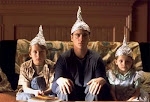 Pirates of the Caribbean is one of the highest quality movies I have ever seen. Johnny Depp is clever. The plot ties together brilliantly. There's lots of funny stuff.
Pirates of the Caribbean is one of the highest quality movies I have ever seen. Johnny Depp is clever. The plot ties together brilliantly. There's lots of funny stuff.
But... although Pirates is meant to be whimsical, it communicates a lot of misleading romanticisms about being a pirate.
There can be no fellowship or any kind of life worth mentioning amongst those who thieve and lie for a living. Pirates cannot be friends because such a trusting relationship grinds against everything they believe in.
Notice how there are resolutions to Jack Sparrow's or Will Turner's problems whenever they don't act like pirates. Jack saves Elizabeth, which gets him jailed straight away, but it eventually opens up all the possibilities he was looking for to retrieve the Black Pearl. At the end of the movie Jack's friends go against "The Code" to pick up Jack and take him back to sea. When Will and Jack risk their necks for each other, they both end up winning.
Doing the right thing, even if it costs us something, is the most efficient way to get right with ourselves, our relationships and the world around us.
Like any other movie about crime versus justice, Pirates makes it hard to remember that crime is not good. Is it OK that we're entertained by all the things we know to be wrong?
When we watch a movie about detectives tracking down a serial killer, our moral instincts keep us glued to the screen. We know in our consciences that the law must prevail or else evil people will prey on the innocent. We also care about criminals getting caught because we have a healthy fear of what will happen to us if they continue to get away with murder.
A related deception relates to movies that portray one rebellious guy who saves the day by breaking all the rules. Rebellion is not a good thing in itself. We should seek after good, not just avoid evil.
Pirates of the Caribbean -- No Fellowship Amongst Thieves
Subscribe to:
Post Comments (Atom)

























2 comments:
Well, first off, you're conflating ethics with law. Unfortunately, laws are not always rational, let alone in line with ethics. (The most egregious example being the legal -- and Biblical -- approval of slavery.)
Americans have a romantic sense of the outlaw figure in so many of its forms: the hacker, the renegade cop, the bandit (Billy the Kid), and, of course, the pirate. This reflects several interesting things about American culture:
- a surprisingly large number of lawmakers in America are relatives of members of the older generation of lawmakers, ie. the legislature is a kind of hereditary aristocracy, which not only makes the laws we all have to live by, but also benefits from the lobbyists whose interests they often end up serving.
- the common Joe, while he or she may not articulate this, recognizes that laws aren't always rooted in ethical principles, but are just as often designed for the expediency of the upper class, of which they will never be a part, no matter how "democratic" their voice supposedly is
- the anti-authoritarianism that naturally emerges from being confronted with a law-enforcement and (ostensible) justice system where authorities commonly claim to be serving the public good but are usually serving the (unegalitarian, and for many oppressive) status quo and the interests of the rich. How can any sane individual who isn't rich be anything but anti-authoritarian?
Thus the American romance with The Outlaw. It's all pretty straightforward, if you take the time to recognize that law and "the good" are not always (in fact, are almost never) one and the same. The fantasy of living somehow free of this corrupted system, and moreover being heroic and good (like all outlaws eventually are portrayed to be) is all just part of the same American anti-authoritarianism that fueled the vast inventiveness in American culture... and unfortunately also fuels arrogant rejection of science by far too many Biblical fundamentalists.
thanks for your thoughts gorgsellar,
when i refer to law i am thinking of God's law, which is a lot more straightforward than man-made law. God's law can be whittled down to the 10 commandments. Jesus whittled them down to two:
-- Love God with your heart, mind and soul
-- Love your neighbor as you love yourself.
Every man-made law worth mentioning is a derivation of God's law. (as you mentioned, men have enacted law that's designed to benefit the privileged few).
But God's law is perfect, not only logically, but spiritually. Our consciences are designed by God to work with God's law.
Therefore, God's law has everything to do with ethics. We might even use God's law to troubleshoot our man-made laws to find out why some of them are unethical.
On a related note, our consciences work together with God's law (which is perfect) as an ethical compass. If our consciences aren't excessively callused then we will be able to look at ourselves versus God's law and realize that we are desperately evil and are therefore in dire need of God's mercy and forgiveness.
Post a Comment